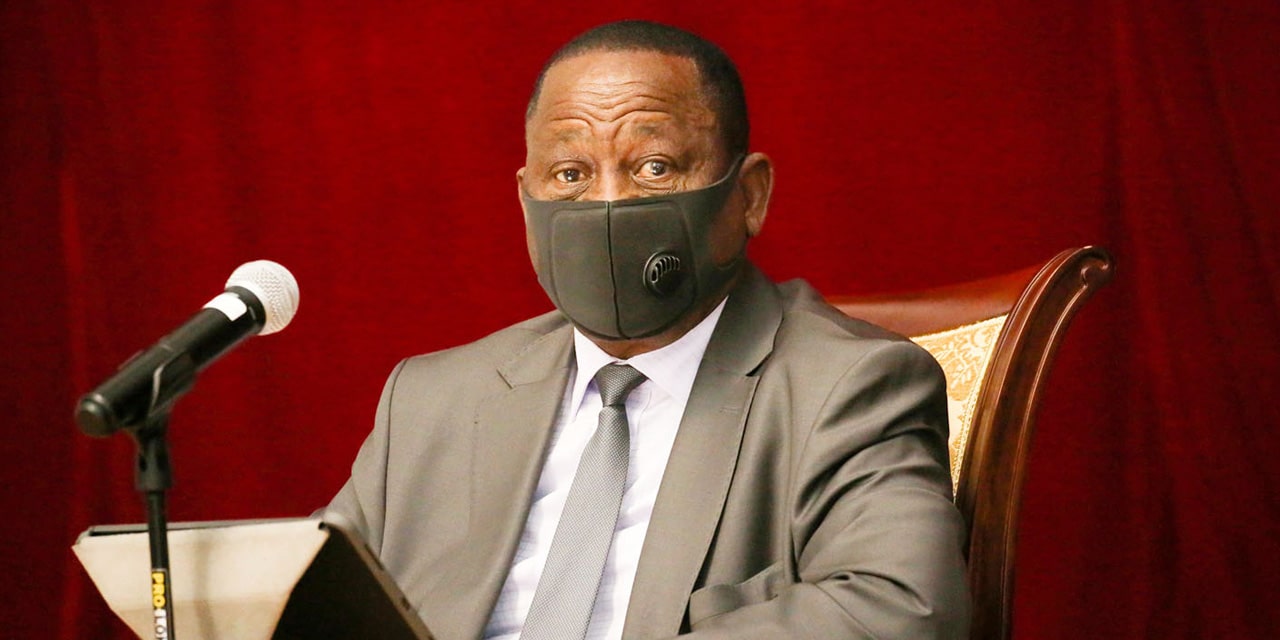Kandjemuni Kamuiiri
Health and Social Services Minister, Kalumbi Shangula on Friday announced an extension to the current COVID-19 regulations, with minor changes to the measures, including reducing the maximum number of people to attend both indoor and outdoor events to 50, from the current 100.
“The Public Health Covid-19 General Regulation as published in Government Gazette No 7522 of the 30 April 2021 remains in force. The Public Health Regulations that came into force on 1 May 2021 will expire at midnight on 31st May, 2021 and under the amended dispensation, which will start on the first of 1 June 2021 until the 30th June 2021, authorised public gatherings will be reduced from the current 100 to a maximum of 50 people per event, both indoors and outdoors,” he said.
The Health minister said he is concerned about the high number of COVID-19 infections, increasing hospitalisations, and deaths being recorded on a daily basis as the increasing number of cases exerts pressure on the public health system.
“What we have observed over the past months is that members of the public are flagrantly disobeying the regulations and putting families, our communities and our country at risk. The measures being put in place are difficult, but they are necessary,” Shangula said.
In terms of the curfew, the time will remain between 22:00-04:00 as it currently is, while the sale of alcohol on Sundays will remain prohibited.
Shangula revealed that at certain activities like sporting events, spectators are limited to 50 persons per event.
“It is mandatory for the spectators to comply with public health measures at all time. Contact sports are prohibited,” he said.
On restrictions relating to entry into Namibia, all travelers are required to produce a SARS COV-2 PCR negative result (valid for 7 days from the date of specimen collection).
“Antigen Rapid Diagnostic Test results will no longer be accepted for entry into Namibia at ports of entry. All travelers coming from or transiting through hotspot regions such as India, are required to repeat the SARS CoV2 PCR test seven days after arrival in Namibia,” Shangula said.
Namibian students studying abroad will be exempt from bearing the cost of COVID-19 tests upon departure from Namibia for academic purposes, provided adequate proof is presented.
Travelers returning to Namibia within seven days will not be required to present a negative SARS COV-2 PCR test result from the country of departure.
“Any person presenting fake SARS COV-2 PCR test results will be prosecuted. Any non-Namibian who presents fake or forged SARS COV-2 PCR test results to an official at any port of entry will be denied entry into Namibia and will be deported at own cost,” the Health minister said.
The regulation for public transport remains unchanged. Deaths and burials related regulations also remain unchanged.
“The embalming of human remains of persons who died of notifiable infectious diseases is prohibited,” he said.
According to Shangula burial attendees must disperse immediately after the burial service. He added that the congregation of attendees at the residence of the deceased or any other place for the purpose of meals is strongly discouraged, as such gatherings offer fertile ground for Covid-19 transmission.
“Posthumous re-swabbing of human remains of persons who die of COVID-19 is prohibited, except in specified circumstances as determined by an authorised person. It should however be noted that COVID-19 infection is NOT a valid reason to forgo a postmortem/autopsy examination if it is indicated,” the minister said.
Currently, new COVID-19 infections, hospitalisations and deaths are being reported daily almost in all regions around the country. Shangula said “the increasing number of persons experiencing severe illnesses means that space in our isolations facilities and intensive care units, in both the public and private sectors, are becoming full. The pressure on the oxygen supply infrastructure has also increased.”
“As part of our national preparedness and response, we have put in place measures such as isolation facilities and intensive care facilities to care for those who fall ill due to COVID-19. We have bought various medical equipment such as ventilators and monitors to support health care services. We have recruited temporary and permanent staff to boost existing capacity. “
To date, Namibia has tested a total of 426,874 samples for COVID-19 at eleven (11) certified SARS CoV2 testing laboratories around the country. This achievement has put Namibia in second place, just after South Africa, of countries that have conducted the highest number of COVID-19 tests on the African Continent.
“The more people we test for COVID-19, the more we are able to detect new cases of COVID-19 in the community that need to be rapidly isolated and contact traced, in order to break chains of transmission in our communities,” he said.
“Namibia remains one of the few countries that has liberal control measures against Covid-19 pandemic. We have been urged by fellow Namibians to impose stricter measures in order to contain further transmission and save lives. We are striving to have our country assumes a semblance of normalcy.”
The latest statistic from the health ministry read that 300 new cases were recorded in one day, with President Hage Geingob and his wife, Monica Geingos having tested positive for COVID-19.




